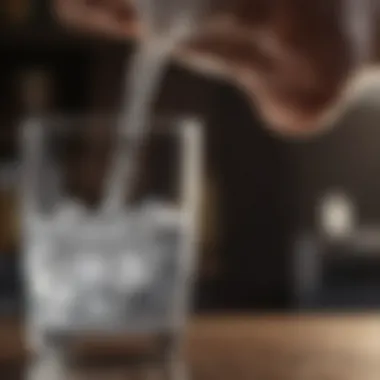Effective Strategies for Hangover Headache Relief


Intro
Hangover headaches are a common issue for many individuals who indulge in alcohol. The discomfort resulting from a hangover can often cloud judgment and affect daily functioning. This article explores effective strategies to alleviate the pain associated with hangover headaches and improve overall well-being. It covers a range of practical solutions, addressing hydration, nutrition, sleep quality, and over-the-counter medications designed to relieve symptoms. Understanding how these strategies work is crucial for both short-term relief and long-term prevention of future hangovers.
Key Benefits
Physical Health Benefits
Alleviating hangover headaches through proper strategies offers several benefits to physical health. Recovery from a hangover typically involves replenishing nutrients lost due to dehydration. Consuming fluids can help mitigate headache symptoms and restore balance in the body. Additionally, choosing nutrient-rich foods can provide essential vitamins and minerals that assist in recovery and improve digestive health. Proper hydration and nutrition also enhance cardiovascular health, which is vital for overall energy levels and resilience.
Mental Well-being Enhancements
Hangover headaches often result in mental fog and irritation. Addressing these symptoms helps improve cognitive function and mood. Adequate hydration supports brain health, while balanced meals can stabilize blood sugar levels, allowing for better mental clarity. Engaging in calming activities, like gentle stretching or mindfulness practices, can promote emotional stability. Collectively, these approaches not only alleviate symptoms but also foster a more positive state of mind.
"The importance of hydration and nutrition cannot be overstated when dealing with hangover headaches."
Practical Tips
Effective Meal Planning
When planning meals to combat hangovers, consider incorporating:
- Whole grains: They provide sustained energy and help regulate blood sugar levels.
- Fruits like bananas and oranges: These are high in potassium and vitamin C, which aid in recovery.
- Proteins: Eggs, lean meats, and legumes can help stabilize energy levels and provide essential amino acids.
Creating a meal plan that features these components will offer a balanced approach to recovery.
Quick and Efficient Workouts
Light exercise can be beneficial when recovering from a hangover.
- Aim for brisk walking or gentle yoga.
- Stretching exercises can relieve tension headaches.
- Keeping workouts short and manageable is key to minimizing fatigue and discomfort.
Incorporating these practices can significantly reduce the severity of headaches while promoting a quicker recovery. These strategies create a solid foundation for not just dealing with hangover symptoms but also enhancing overall health and well-being.
Understanding Hangover Headaches
Understanding hangover headaches is crucial for anyone dealing with the repercussions of excessive alcohol consumption. This section serves as a foundational layer for navigating through remedies and prevention strategies. Recognizing the nature of hangover headaches allows individuals to implement effective tactics to alleviate discomfort while also informing lifestyle choices to mitigate future occurrences. The significance of this understanding cannot be understated, as it includes insights into the physiological factors involved.
Definition of Hangover Headaches
Hangover headaches are defined as headaches that arise after the consumption of alcohol, typically occurring the following day. The pain is generally characterized as dull or throbbing and may vary in intensity. The term encompasses various types of headaches, including tension-type and migraines, triggered by the body’s reaction to alcohol intake. Recognizing this definition helps individuals identify the source of their headaches accurately, facilitating appropriate responses.
Causes of Hangover Headaches
The mechanisms behind hangover headaches are multifactorial. Primary causes include dehydration, as alcohol acts as a diuretic, leading to fluid loss. This dehydration can strain blood vessels and contribute to pain. Additionally, alcohol induces the release of certain chemicals in the brain, which can exacerbate headache symptoms. Inflammation of the blood vessels, caused by toxic byproducts generated during alcohol metabolism, also plays a significant role. Certain alcoholic beverages, particularly those high in congeners like whisky or red wine, may further intensify these headaches, making it essential to consider not only quantity but also the type of alcohol consumed.
Symptoms Associated with Hangover Headaches
In addition to the headache itself, individuals may experience a range of symptoms that often accompany this condition. Common symptoms include:
- Nausea: A feeling of unease in the stomach that might accompany the headache.
- Sensitivity to light and sound: Increased sensitivity can make the headache feel more severe.
- Fatigue: Overall tiredness often follows a night of drinking.
- Dizziness: An unsettling sensation that can arise with head pain.
These symptoms can vary widely among individuals and may be compounded by personal health factors, leading to differing experiences of a hangover. Understanding these details empowers individuals to approach hangover recovery more effectively.


Immediate Tactics for Relief
Immediate tactics for relief are critical in managing hangover headaches effectively. When faced with discomfort from excessive alcohol consumption, the body requires quick interventions to restore balance. The importance of acting quickly cannot be overstated. Implementing these strategies can mitigate symptoms, enhance recovery, and ultimately lead to a better overall well-being. Choosing the right tactics often depends on individual circumstances, including dietary preferences and personal health conditions.
Hydration: The Key Factor
Hydration is arguably the most crucial factor when addressing hangover headaches. Alcohol acts as a diuretic, promoting increased fluid loss. This leads to dehydration, which is a primary contributor to headache discomfort. Replenishing fluids should begin immediately after alcohol consumption and continue throughout the recovery period.
Water intake guidelines suggest drinking water before going to sleep and upon waking up. A general recommendation is to consume at least 16-20 ounces of water after the last drink and another 8-10 ounces upon waking. Incorporating electrolyte-rich fluids can enhance hydration efforts. Such beverages restore lost minerals, aiding in faster recovery.
"Staying hydrated is essential for relieving hangover symptoms effectively."
Nutrition Strategies
Nutrition plays a significant role in alleviating hangover headaches. The body depletes essential vitamins and minerals during alcohol metabolism, leading to fatigue and discomfort. Understanding what to eat can greatly influence how quickly one recovers.
Foods high in carbohydrates, like toast or crackers, can help stabilize blood sugar levels, which often drop after drinking. Incorporating fruits like bananas or avocados can provide potassium, an essential mineral that gets depleted due to alcohol. Protein-rich options, such as eggs, support the liver's detoxification processes. Moreover, these eating strategies help restore energy levels and combat fatigue.
Pain Relief Medications
Pain relief medications are another effective method to alleviate hangover headaches. Over-the-counter options can provide quick relief from headache pains. Non-steroidal anti-inflammatory drugs (NSAIDs), like ibuprofen or aspirin, are commonly used. They are anti-inflammatory, helping to reduce the pain associated with headaches.
It is important to note that some medications should be avoided. Acetaminophen, for example, can exacerbate liver strain when combined with alcohol. Always consult with a healthcare provider if unsure about which medication to use post-drinking.
In summary, implementing immediate tactics such as proper hydration, thoughtful nutrition, and appropriate use of pain relief medications can significantly impact recovery from hangover headaches. These strategies lay the groundwork for a more comprehensive approach to managing discomfort effectively after a night of excessive drinking.
Hydration Techniques
Hydration plays a vital role in alleviating hangover headaches. Alcohol consumption leads to dehydration, which significantly contributes to the intensity of hangover symptoms. Understanding and applying effective hydration techniques can help mitigate these symptoms and promote overall recovery.
Water Intake Guidelines
Proper water intake is foundational for recovery from hangover headaches. It is essential to rehydrate the body after it has lost fluids through alcohol consumption.
- Drink plenty of water: Aim for at least 2 to 3 liters of water within the 24 hours following alcohol intake. This helps replace lost fluids and supports bodily functions.
- Sipping rather than gulping: Consuming water in small sips can be more effective to prevent nausea and promote absorption.
- Monitor urine color: A pale yellow color indicates proper hydration, while dark urine suggests the need for more fluids.
Electrolyte-Rich Beverages
In addition to water, replenishing electrolytes is crucial for recovery. Electrolytes help maintain fluid balance and support nerve and muscle function, which may be disrupted following a night of drinking.
Consider incorporating the following:
- Sports drinks: Beverages like Gatorade or Powerade provide electrolytes, but watch for added sugars.
- Coconut water: This is a natural source of electrolytes, specifically potassium, and is low in calories.
- Homemade electrolyte solution: Mix water, a pinch of salt, and a small amount of sugar or honey to create an effective hydrating drink.
Herbal Teas and Their Benefits
Herbal teas can offer a soothing and hydrating alternative to plain water. They not only contribute to hydration but also possess additional health benefits that may ease headache symptoms.
- Ginger tea: Known for its anti-nausea properties, ginger tea can help alleviate queasiness that often accompanies a hangover.
- Peppermint tea: This can promote digestion and ease headache discomfort through its cooling properties.
- Chamomile tea: Recognized for its calming effects, chamomile can also aid sleep, which is beneficial for recovery.
Incorporating a variety of hydration strategies can significantly enhance recovery from hangover headaches. Focus on both water intake and electrolyte balance to help restore what alcohol consumption has depleted.
Nutritional Recommendations


Nutritional recommendations are vital for managing hangover headaches. What you consume can directly affect how you feel after drinking alcohol. This section explores beneficial food choices, the importance of vitamins and minerals, and meal timing and composition to combat hangover symptoms effectively.
Foods to Combat Hangover Symptoms
Certain foods can alleviate hangover symptoms through hydration and nutrient replenishment. Foods rich in water content help with hydration. Examples include fruits like watermelon and oranges, which also provide natural sugars. Complex carbohydrates, such as whole grains, can help stabilize blood sugar levels.
Additionally, proteins such as eggs and lean meats supply amino acids that break down toxins produced by alcohol. Foods high in potassium like bananas can help with hydration and reduce headache symptoms. Fermented foods such as yogurt can aid digestion, which is often affected after heavy drinking.
Consider incorporating these foods:
- Watermelon
- Bananas
- Eggs
- Whole grains
- Yogurt
The Role of Vitamins and Minerals
Vitamins and minerals might help restore what is lost during alcohol consumption. Vitamin B complex plays a role in energy production and neurological health. Foods rich in B vitamins are essential after drinking. Foods include leafy greens, super grains, and legumes.
Vitamin C also supports overall health and immune function. It can be found in citrus fruits, strawberries, and bell peppers. Minerals like magnesium and zinc help reduce inflammation and support recovery. Broccoli and nuts are excellent sources of these minerals. Keeping these vitamins and minerals in mind can lead to better recovery from hangover headaches.
Importance of Meals: Timing and Composition
Timing and meal composition play critical roles in alleviating hangover headaches. Eating balanced meals before and after alcohol consumption is important. A meal rich in healthy fats, proteins, and carbohydrates can slow the absorption of alcohol, reducing its effects on the body.
After heavy drinking, a nutrient-dense breakfast can kick-start recovery. Ideally, meals should include whole foods and minimal processed items. Spacing meals with nutrient-dense snacks can keep energy levels stable and aid in easing headache discomfort. Aim for small meals every few hours to maintain nutrient levels without overwhelming the stomach.
The Impact of Sleep
Sleep plays a crucial role in the recovery process for anyone experiencing hangover headaches. When the body is subjected to the toxins associated with alcohol, the impact on both physical and mental well-being is significant. Inadequate sleep can exacerbate the symptoms of a hangover, including the intensity of headaches. A lack of quality rest can lead to increased irritability, fatigue, and cognitive impairment, making it essential to prioritize sleep for optimal recovery.
Adequate sleep not only helps in alleviating headache symptoms but also aids the body in detoxification. When we sleep, the body undergoes various repair mechanisms which are vital for recovery. Hormonal balancing, muscle recovery, and memory consolidation occur predominantly during sleep, all of which can be disturbed by excessive alcohol consumption.
Benefits of Quality Sleep for Hangover Relief:
- Reduces Pain Sensitivity: Sufficient sleep helps in reducing the perception of pain, including headaches or migraines.
- Enhances Mood Stabilization: Quality rest improves mood, countering feelings of anxiety or depression commonly associated with hangovers.
- Promotes Physical Recovery: Sleep supports essential bodily functions that repair at a cellular level.
By understanding this connection between sleep and the alleviation of hangover headaches, individuals can seek to incorporate better sleep practices post-consumption.
Sleep Quality and Headaches
The link between sleep quality and headaches is complex. Insufficient or disrupted sleep can contribute significantly to the severity and frequency of headaches, including those caused by hangovers. Sleep disorders, common among those who consume alcohol, can lead to increased headache incidence.
Research suggests that a full sleep cycle is necessary for optimal wellness. Disturbances in this cycle, such as waking frequently or difficulty falling asleep, can raise the likelihood of stress and tension headaches. Alcohol consumption can impact sleep architecture; it can inhibit deep sleep stages, which are vital for restorative processes.
To ensure better sleep quality, consider the following tips:
- Create a Relaxing Environment: Make sure your sleeping space is dark and quiet.
- Limit Screen Time: Reducing exposure to screens before sleep can help in maintaining a natural sleep cycle.
- Establish a Routine: Going to bed and waking up at the same time each day reinforces the body's natural rhythms.
Improving sleep quality can lead to a noticeable decline in the intensity of hangover headaches, making it a key focus for recovery.
Napping Strategies
For those who find themselves suffering from a hangover headache, short naps can provide an effective solution for quick relief. Napping can help replenish the lost sleep during the night, particularly when alcohol has disrupted sleep patterns. Strategies for effective napping include:
- Keep It Short: Aim for power naps of 20-30 minutes. This duration is long enough to provide a mental refresh without entering deep sleep, which can lead to grogginess.
- Create a Comfortable Space: Find a quiet and dark location to enhance your napping experience.
- Timing is Key: Optimal times for a nap are typically in the early afternoon. Napping too late in the day can interfere with nighttime sleep.


Napping has the potential to rejuvenate by alleviating some of the tiredness brought on by a hangover and improving overall cognitive function.
In summary, understanding the impact of sleep is vital in managing and alleviating hangover headaches. Prioritizing sleep quality, along with smart napping strategies, can significantly help in recovery and overall well-being.
Preventive Lifestyle Adjustments
Preventive lifestyle adjustments play a crucial role in managing and mitigating hangover headaches. These adjustments go beyond merely treating symptoms after they appear; they offer the potential to prevent the discomfort from occurring altogether. By adopting these strategies, individuals can significantly reduce their susceptibility to the effects of excessive alcohol consumption. Such strategies focus on moderation, preparation, and making informed decisions about drinking.
Making conscious choices ahead of time can save a person the regret and discomfort of a hangover, allowing for better overall health and wellness. These adjustments not only benefit individuals on party nights but can help establish a healthier lifestyle in general.
Moderation in Alcohol Consumption
Moderation in alcohol consumption is fundamentally about understanding personal limits. It is easy to overindulge, especially in social settings. Recognizing thresholds for responsible drinking can vary widely among individuals. Here are some actionable steps for moderation:
- Know Your Limits: Understand how much you can consume without feeling adverse effects.
- Drink Slowly: Sipping drinks can prevent rapid intoxication. Spacing out drinks is helpful.
- Alternate with Water: For every alcoholic beverage, consider drinking a glass of water. This helps maintain hydration.
By adhering to these principles, the risks of headache and other hangover symptoms decrease. Individuals often view alcohol as a way to ease social anxiety or enhance enjoyment, but moderation transforms these interactions into more pleasant experiences, devoid of setbacks.
Pre-drinking Strategies
Pre-drinking strategies involve preparative steps taken before engaging in consumption. These strategies focus on hydration and nutrition, setting a strong foundation for alcohol tolerance. Consider the following:
- Stay Hydrated: Hydrate throughout the day. Begin drinking water hours before consuming alcohol.
- Eat Before Drinking: Have a balanced meal that includes carbohydrates, proteins, and healthy fats. This can slow alcohol absorption.
- Choose Beverages Wisely: Opt for lower alcohol-content options or mixed drinks that are less likely to lead to overindulgence.
Implementing these strategies fosters a more controlled drinking environment. They enable individuals to enjoy social moments without the heavy price the next morning.
Planning Ahead: Choosing Timing and Venue
Effective planning when selecting timing and venue for social gatherings can greatly affect drinking experiences. Assessing different aspects can mitigate hangover risks:
- Select Your Events Wisely: Avoid back-to-back parties or events with high alcohol consumption.
- Limit Duration: Having a timeline for drinking can signal to stop at a certain point, reducing volume.
- Choose Comfortable Settings: Environments that promote moderation, like smaller gatherings, often lead to less excessive drinking.
These considerations can guide participants to make wiser choices, leading to a more enjoyable and less painful aftermath.
"Preparing is often as impactful as the decisions made in the moment. Thoughtful planning can prevent many regrettable outcomes."
By incorporating these preventive lifestyle adjustments, individuals can engage in social drinking with more awareness. As a result, they bolster their ability to avoid the potential pitfalls of hangover headaches and foster healthier habits overall.
Consulting Healthcare Professionals
When dealing with hangover headaches, the expertise of healthcare professionals can play a crucial role. Consulting with a doctor or a healthcare practitioner can provide tailored insights for effective relief. They can also assist in distinguishing between typical hangover symptoms and more serious underlying conditions, such as migraines or dehydration-related issues.
A visit to a healthcare professional can be particularly important for individuals with pre-existing health conditions or those taking medication. Certain medications may interact negatively with over-the-counter pain relievers or other remedies. Therefore, getting guidance from a qualified individual ensures safer choices that minimize the risk of adverse effects.
Benefits of Consulting Healthcare Professionals:
- Personalized Care: Professionals can assess each individual's health background and offer specific recommendations.
- Comprehensive Understanding: They bring a broad understanding of how hangovers impact different body systems.
- Long-term Strategies: Healthcare professionals can suggest preventive strategies to reduce the likelihood of future hangover headaches.
"Always prioritize professional advice when your symptoms feel unusual or severe. It can save you from further complications."
In addition, being proactive about seeking medical advice allows individuals to address any complications the hangover might engender. For some, symptoms may persist or worsen, indicating a need for medical intervention. Prompt consultation can lead to appropriate treatment plans, ultimately improving the patient's quality of life.
When to Seek Medical Advice
Identifying the right moment to seek medical advice is essential. While most hangover symptoms are minor and self-limiting, certain signs may warrant professional evaluation. Here are key indicators:
- Severe Pain: If headaches are exceedingly strong and do not respond to typical pain relief methods.
- Persistent Symptoms: Symptoms lasting longer than 24 hours suggest a need for assessment, as they could signify underlying issues.
- Neurological Symptoms: Experiencing visual disturbances, confusion, or difficulty speaking necessitates immediate medical attention.
- Dehydration Signs: Symptoms like extreme thirst, dry mouth, reduced urination, or dizziness require prompt fluid replacement and possibly medical intervention.
Understanding these indicators can shape responsible decisions regarding seeking medical help. Proper guidance helps to ensure that recovery is not only effective but also safe.















